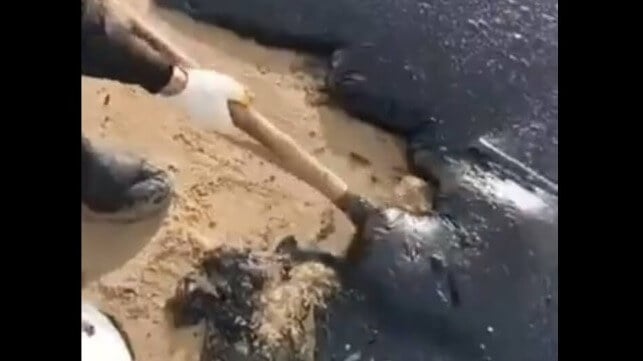Video: Storm Scatters Bags of Oily Waste From Spill Cleanup in Russia

The bunker-fuel cleanup in the Kerch Strait region encountered a setback over the holidays: renewed stormy weather, combined with slow removal of bagged sludge. The efforts of countless volunteers went to waste when wave action tore open collected bags and scattered their contents across the waterfront near Anapa, according to Russian social media reports.
On December 15, the 50-year-old Russian tanker Volgoneft 212 broke up near the Kerch Strait, spilling an unknown quantity of the Russian bunker fuel known as "mazut." The vessel had 4,300 tonnes of the product aboard at the time of the casualty, according to Russian media. At about the same time, the tanker Volgoneft 239 ran aground nearby, and it gradually broke open over the span of the following days. Between the two wrecks, the total estimated volume of spilled fuel oil amounts to 3,700 tonnes, according to Russian authorities.
Much of the pollution has washed ashore in the province of Krasnodar, near Anapa. Responders and volunteers have collected a reported 1,700 tonnes of oily sand to date. However, locals involved in the beach cleanup have complained of limited heavy equipment support to help remove the waste, and bags of oiled sand have accumulated along the beachfront. This week, another heavy storm blew through the region and scattered hundreds of these bags along the waterfront.
Even where it has been collected, the bagged waste has not always been properly disposed of, according to some residents. Videos posted to Russian social media appear to show excavators attempting to bury the bagged waste in the middle of the beach, instead of inshore where it would be away from wave action.
The Black Sea coast is grappling with an ecological disaster following an oil spill caused by the sinking of two tankers in the Kerch Strait on December 15. The spill has affected 800 square kilometres, and the tanker continues to leak, according to TASS. Bags of collected oil… pic.twitter.com/fKOWc9ZYpt
— Volcaholic ???? (@volcaholic1) December 24, 2024
"We didn't come here to clean up fuel oil manually for their praise, we breathe in toxic fumes. We do this to save nature at least a little. In the end, they [officials] lie that 'everything is fine, there is enough of everything,' and because of their misinformation, the collected fuel oil is not removed on time," one frustrated Russian volunteer told Radio Free Europe. "Some of the bags were carried out to sea, turned upside down, some were washed back to the shore."
Multiple strandings and deaths of threatened Azov dolphins have also been reported, along with thousands of oiled birds. Due to a shift in wind direction, fuel contamination is now drifting towards the Crimean side of the Kerch Strait and may soon wash ashore in the Feodosia area.
"The discharge of fuel oil on our beaches threatens a greater disaster than for Anapa. The local sand is looser with a high shell content, its consistency is much softer and more porous than in the Anapa area," an environmental activist in Feodosia told Radio Free Europe's Crimean service. "Volunteers have already found birds injured by fuel oil in some places on our beaches."
Despite the vessel casualties and concerns about safety, AIS data shows that the Volgoneft tanker fleet continues to trade in the Kerch region.
